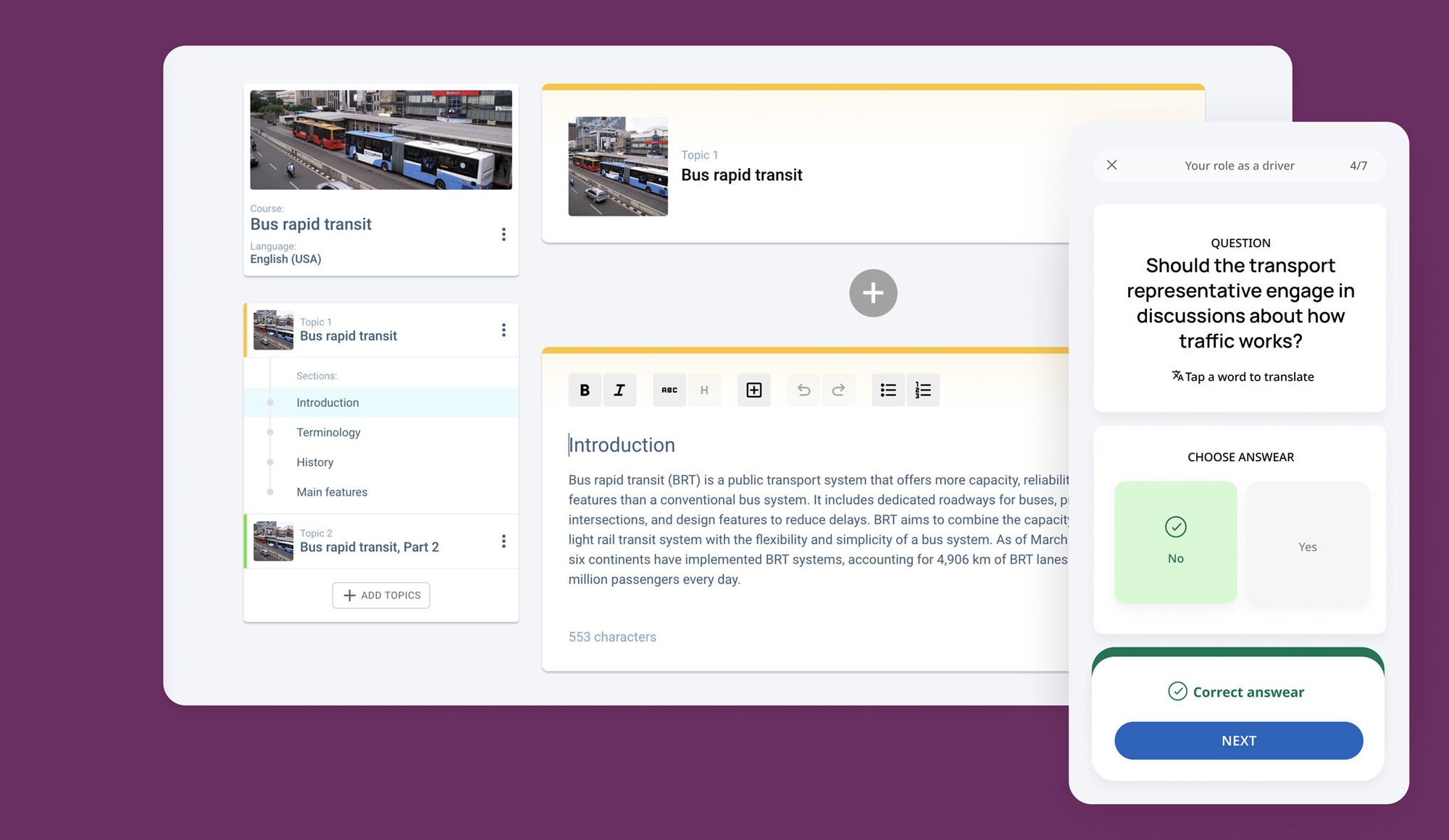Effective leadership is essential for the success of any organisation. As new managers enter their roles, they must acquire the management skills and knowledge necessary to navigate the team's challenges. This article will explore fifteen crucial areas that new employees should focus on during their leadership training for new managers. From continuous learning and feedback to understanding organisational dynamics and building high-performing teams, each area plays a vital role in developing strong leadership skills.
1. Continuous learning: staying relevant as a leader
By staying current with industry trends and developments, managers can adapt their leadership styles and strategies to remain relevant. Attending conferences, reading industry publications, and seeking mentorship are ways upcoming managers can continue to learn and grow as leaders.
Furthermore, with the rise of digital transformation and the increasing reliance on technology in the workplace, leaders need to develop their digital skills. Understanding how to leverage data analytics, artificial intelligence, and other emerging technologies can give managers a competitive edge in decision-making and problem-solving. Online courses and workshops on digital literacy can help leaders stay ahead in this rapidly evolving digital landscape.
Moreover, practical communication skills are paramount for leaders to inspire and motivate their teams. Leaders who can articulate a clear vision, provide constructive feedback, and actively listen to their team members are likelier to foster a positive and productive work environment. Investing in communication training and practising effective communication techniques can significantly enhance leaders' ability to connect with their teams and drive success.
2. Feedback and performance reviews: creating a culture of growth
Creating a culture of growth within an organisation is a multifaceted process that requires dedication and commitment from both managers and employees. In addition to providing regular feedback and conducting performance reviews, fostering an environment where continuous learning and development are essential is also needed. This can be achieved through mentorship programmes, training sessions, and opportunities for employees to take on new challenges and responsibilities.
Effective feedback is not just about pointing out areas for improvement; it is also about recognising and celebrating achievements. Managers can motivate their team members to strive for excellence and grow professionally by acknowledging and rewarding hard work and success. Performance reviews are a collaborative effort between managers and employees, where both parties can discuss progress, address concerns, and set clear objectives for the future.
3. Setting goals and expectations: aligning team objectives
Clear and well-defined goals are essential for any team's success. Managers should work with their teams to set SMART goals (Specific, Measurable, Achievable, Relevant, and Time-bound) that align with the organisation's objectives. Managers can guide their teams towards success by setting expectations and establishing milestones.
When setting goals, managers must consider team members' strengths and weaknesses. By understanding each team member's essential skills and capabilities, managers can assign tasks that match their strengths, ultimately leading to a more efficient and productive team. Additionally, by involving team members in the goal-setting process, managers can foster a sense of ownership and commitment, increasing motivation and accountability within the team.
Furthermore, managers should regularly review and adjust goals as needed. Market conditions, project requirements, and team dynamics can change rapidly, necessitating a flexible goal-setting approach. By conducting regular check-ins and performance evaluations, managers can ensure that goals remain relevant and achievable, making necessary adjustments to keep individual contributors and the team on track towards success.
4. Coaching and mentoring: developing your team's potential
A successful manager is not only someone who can lead but also someone who can build their team members' potential. New managers can help their team members grow personally and professionally by adopting a coaching and mentoring approach. Providing guidance, supporting, and encouraging individual growth are essential to effective leadership.
Coaching involves a more hands-on approach, where the manager works closely with team members to set goals, identify areas for improvement, and provide regular feedback. This one-on-one interaction allows for a deeper understanding of each team member's strengths and weaknesses, enabling the manager to tailor their guidance to suit individual needs. On the other hand, mentoring focuses on long-term professional development together, with the mentor sharing their knowledge and experience to help the mentee navigate their career path.
Effective coaching and mentoring can increase employee engagement, improve job satisfaction, and raise organisational retention rates. They create a continuous learning and personal development culture where team members feel supported in their professional growth. By investing time and effort into coaching and mentoring, managers can enhance their team's performance and build strong, collaborative relationships based on trust and mutual respect.
5. Emotional intelligence: enhancing your management skills
Emotional intelligence is a crucial skill for leaders at all levels. New managers should focus on understanding and managing their emotions and those of their team members. New managers can foster a positive and productive work environment by cultivating empathy, practising active listening, and effectively managing conflicts.
Furthermore, emotional intelligence plays a significant role in building strong relationships within a team. Emotionally intelligent leaders are better equipped to handle the complexities of interpersonal dynamics and can navigate challenging situations with grace and tact. This not only boosts team morale but also enhances overall team performance.
Moreover, emotional intelligence is more comprehensive than managing emotions within the workplace. It also extends to how leaders handle stress and pressure in their personal lives. By developing emotional intelligence, leaders can improve their resilience and ability to cope with demanding work and personal situations, leading to a more balanced and fulfilling existence.
6. Time management: prioritising tasks for maximum impact
Effective time management is crucial for leaders looking to optimise their resources. Prioritising tasks is a fundamental skill that new managers must master to succeed. By identifying and focusing on high-priority tasks, first-time managers can ensure that their efforts are directed towards activities that will significantly impact their team and the organisation.
One key aspect of effective time management is delegating tasks efficiently. Delegating responsibilities to team members helps distribute workload and allows employees to take ownership of their work. This frees up the manager's time to focus on strategic initiatives and fosters a sense of trust and collaboration within the team.
7. Conflict resolution: navigating difficult conversations
Conflict is an inevitable part of any workplace. New managers should develop the management skills to navigate difficult conversations and constructively resolve conflicts. By promoting open communication, active listening, and empathy, managers can turn conflicts into opportunities for growth and collaboration.
One key aspect of conflict resolution is understanding the different conflict resolution styles that individuals may exhibit. Some people prefer avoiding conflict altogether, while others confront it head-on. Recognising and respecting these differences can help managers tailor their approach to each situation, leading to more effective resolutions.
Furthermore, managers must create a safe and inclusive environment where employees feel comfortable expressing their concerns. This can be achieved through regular team meetings, one-on-one check-ins, and anonymous feedback channels. By fostering a culture of open communication, managers can address conflicts early on before they escalate into more significant issues that could disrupt the team dynamic.
8. Building trust and credibility with your team
Trust and credibility are the cornerstones upon which a successful team is built. As a new project manager, it is crucial to understand the significance of establishing trust within your team. Transparency plays a vital role in this process, as keeping your team informed about decisions, challenges, and successes can foster an environment of openness and collaboration.
Furthermore, delivering on promises is essential in building trust with your team members. Consistently following through on your commitments demonstrates reliability and integrity, reinforcing your leadership credibility. Setting realistic expectations and meeting them will earn your team's trust and cultivate a sense of accountability and respect within the group.
9. Effective communication: the cornerstone of leadership
Effective communication is the most crucial skill for any leader. New managers should improve their verbal and written communication skills to ensure that their team members clearly understand their messages. By practising active listening, providing timely and relevant information, and encouraging open dialogue, managers can facilitate effective communication within their teams.
Furthermore, effective communication is not just about spoken or written words; non-verbal communication also plays a significant role in conveying messages. Body language, facial expressions, and tone of voice can all impact how a message is received. For example, a manager who maintains eye contact and nods in agreement while listening to a team member demonstrates attentiveness and respect, fostering a positive communication environment.
Moreover, the choice of communication channels can significantly influence the effectiveness of the message. While face-to-face meetings allow immediate feedback and personal connection, emails help document information and provide a written record. Understanding when to use each communication channel is essential for ensuring messages are delivered appropriately and effectively.
10. Understanding organisational structure and dynamics
Every organisation has its unique structure and dynamics. The managers should invest time in understanding their organisation's structure, including reporting lines, decision-making processes, and organisational culture. By gaining this understanding, managers can navigate the complexities of their organisation and build relationships with key stakeholders.
Organisational structure refers to how a company arranges its employees and roles to ensure efficient operations and clear communication channels. It can take various forms, such as hierarchical, matrix, or flat structures, each with advantages and challenges. Understanding the structure can help managers identify who holds power and influence within the organisation, enabling them to work effectively with different teams and departments.
Furthermore, organisational dynamics encompass the interactions, relationships, and behaviours that shape how work gets done within the company. This includes team collaboration, communication styles, and conflict resolution mechanisms. By delving into the dynamics of the organisation, managers can pinpoint areas for improvement, foster a positive work environment, and drive innovation and productivity.
11. Building and leading high-performing teams
Successful leaders know how to build and lead high-performing teams. The managers should create a team culture that values collaboration, diversity, and innovation. Managers can develop teams that consistently deliver excellent results by selecting the right team members, setting clear expectations, and providing emerging leaders with the necessary support and resources.
Building a high-performing team requires more than just assembling a group of individuals with essential management skills and backgrounds. It fosters trust and psychological safety among team members, encouraging open communication and constructive feedback. Influential leaders understand the importance of creating an environment where team members feel empowered to share their ideas and take calculated risks without fear of judgment.
Furthermore, leading a high-performing team involves recognising and celebrating individual and collective achievements. Acknowledging team members' contributions to performance management boosts morale and reinforces a culture of appreciation and recognition. By regularly highlighting successes and milestones, leaders can inspire their teams to strive for continuous improvement and excellence.
12. Adapting to change and driving innovation
Leadership requires the ability to adapt to change and drive innovation. The managers should embrace change as an opportunity for growth and encourage their team members to do the same. By fostering creative leadership and a culture of continuous improvement, managers can ensure that their teams are prepared to tackle new challenges and seize opportunities.
Embracing change in the workplace can lead to increased productivity and efficiency in organisations. When employees are open to new ideas and working methods, they are more likely to find creative solutions to problems and adapt quickly to changing market conditions. This adaptability is crucial in today's fast-paced business environment, where companies must constantly evolve to stay ahead of the competition.
Driving innovation involves more than just coming up with new ideas; it also requires a willingness to take risks and experiment with different approaches. Influential leaders understand the importance of creating a safe space for their teams to explore innovative solutions, even if it means facing failure along the way. By encouraging a culture of experimentation and learning from mistakes, managers can foster creativity and resilience within their teams.
13. Fostering a culture of inclusivity and diversity
Creating an inclusive and diverse work environment is essential for fostering innovation, enhancing team performance, and reflecting the varied backgrounds of customers and clients. New managers should prioritise inclusivity and diversity by actively seeking to understand and appreciate their team members' different perspectives, experiences, and backgrounds.
First, managers should educate themselves about the importance of diversity and inclusion. This involves understanding a diverse team's benefits to problem-solving, creativity, and overall team dynamics. Managers should participate in diversity training programs and workshops to gain insights into unconscious biases and learn mitigation strategies. By becoming more aware of their biases, managers can make more equitable decisions and create a more inclusive work environment.
Second, managers should actively promote a culture of inclusivity by encouraging open dialogue and creating safe spaces where team members feel comfortable sharing their experiences and ideas. This can be achieved through regular team meetings, one-on-one check-ins, and anonymous feedback channels. Additionally, managers should implement inclusive hiring practices to ensure that their team reflects diverse backgrounds and experiences. By fostering an inclusive environment, managers can enhance team collaboration, boost morale, and drive innovation.
14. Navigating legal and ethical issues
Leaders must navigate legal and ethical issues with integrity and professionalism. Such managers should familiarise themselves with their industry or organisation's applicable laws, regulations, and moral standards. By adhering to these standards and leading by example, managers can inspire trust and confidence in their team members.
Understanding the legal landscape is crucial for managers to make informed decisions and avoid potential pitfalls. Laws and regulations vary across industries and regions, so staying up-to-date with changes is essential. Additionally, ethical dilemmas can arise in the workplace, requiring managers to consider the impact of their actions on stakeholders carefully.
Furthermore, creating a culture of transparency and open communication can help mitigate legal and ethical risks. Encouraging employees to speak up about concerns can prevent issues from escalating and foster a more ethical work environment. Effective leadership in this area involves following the rules and promoting a culture of integrity and accountability throughout the organisation.
15. Understanding leadership styles: finding your unique approach
No two leaders are the same, and each has their unique leadership style. New managers should take the time to explore different leadership styles and identify the approach that aligns with their values and goals. Managers can confidently lead their teams and inspire others to succeed by understanding their leadership style.
Exploring various leadership styles, such as transformational, transactional, servant, and democratic, can give new managers a broad perspective on approaching different situations. For instance, transformational leaders focus on inspiring and motivating their team members to exceed their expectations, while transactional leaders emphasise structure, rewards, and penalties to achieve desired outcomes. Servant leaders prioritise the needs of their team members and aim to foster a supportive and empowering work environment. In contrast, democratic leaders encourage participation and collective decision-making, promoting ownership and accountability among team members. By experimenting with these styles, new managers can discover which approach resonates most with their personality and their team's specific needs.
Additionally, new managers should seek feedback from their team and peers to refine their leadership style. Regularly soliciting input can provide valuable insights into how their leadership approach is perceived and its impact on team dynamics. This feedback loop enables managers to make informed adjustments, enhancing their effectiveness as leaders. Furthermore, being adaptable and open to evolving their leadership style based on situational demands can help managers navigate the complexities of their roles more effectively. Finding a unique leadership style is an ongoing journey that requires self-awareness, continuous learning, and a willingness to grow and adapt.



